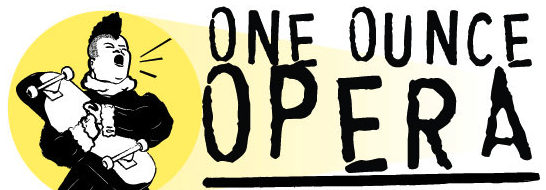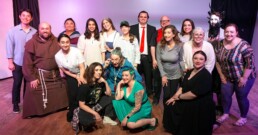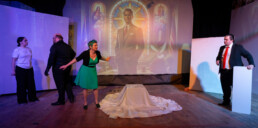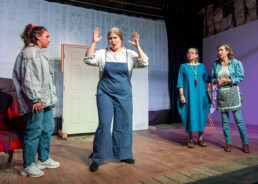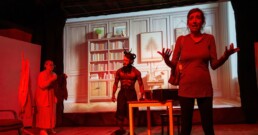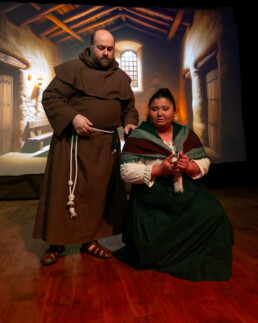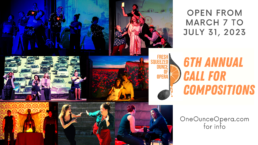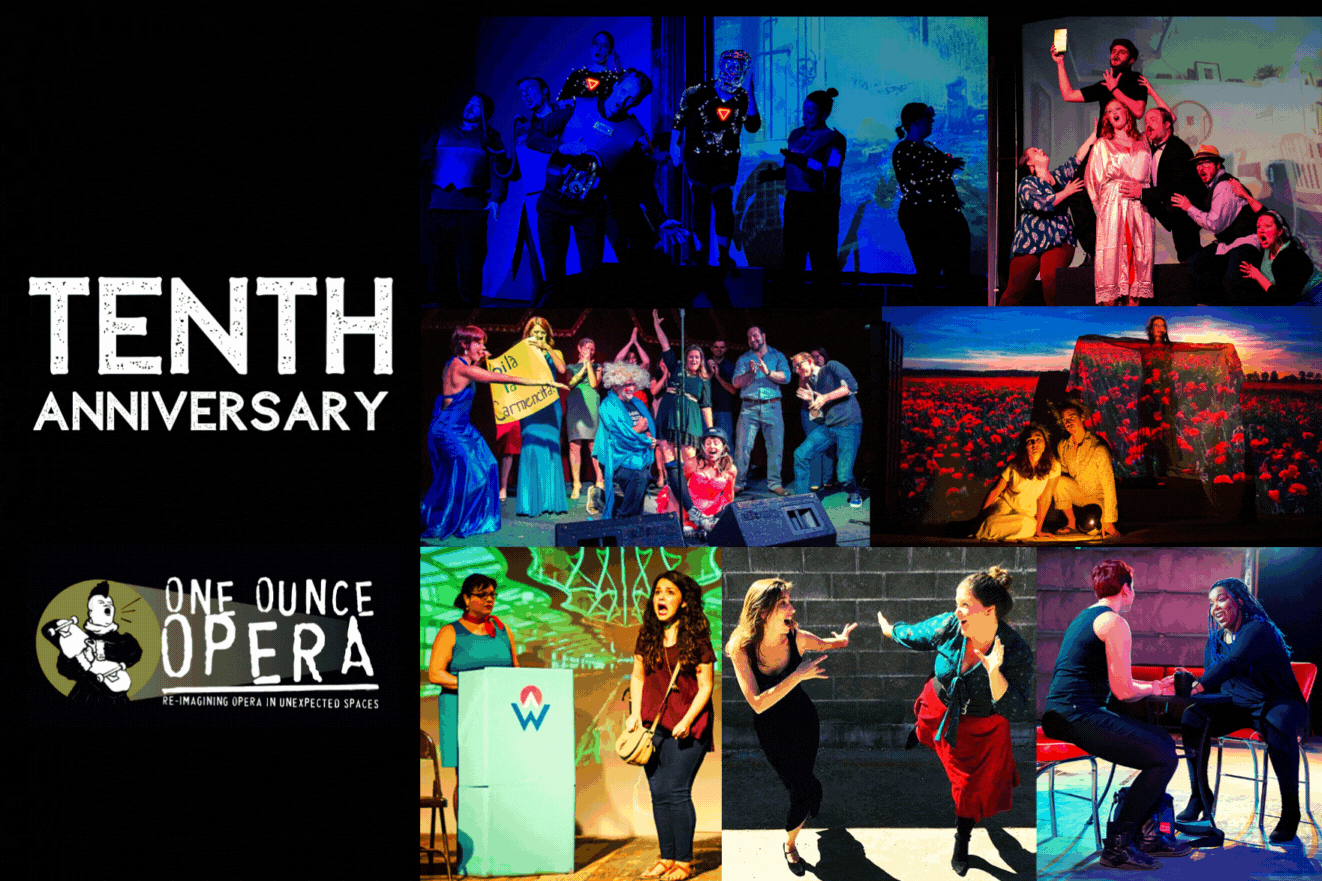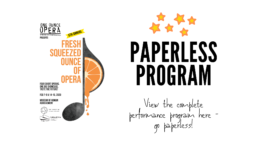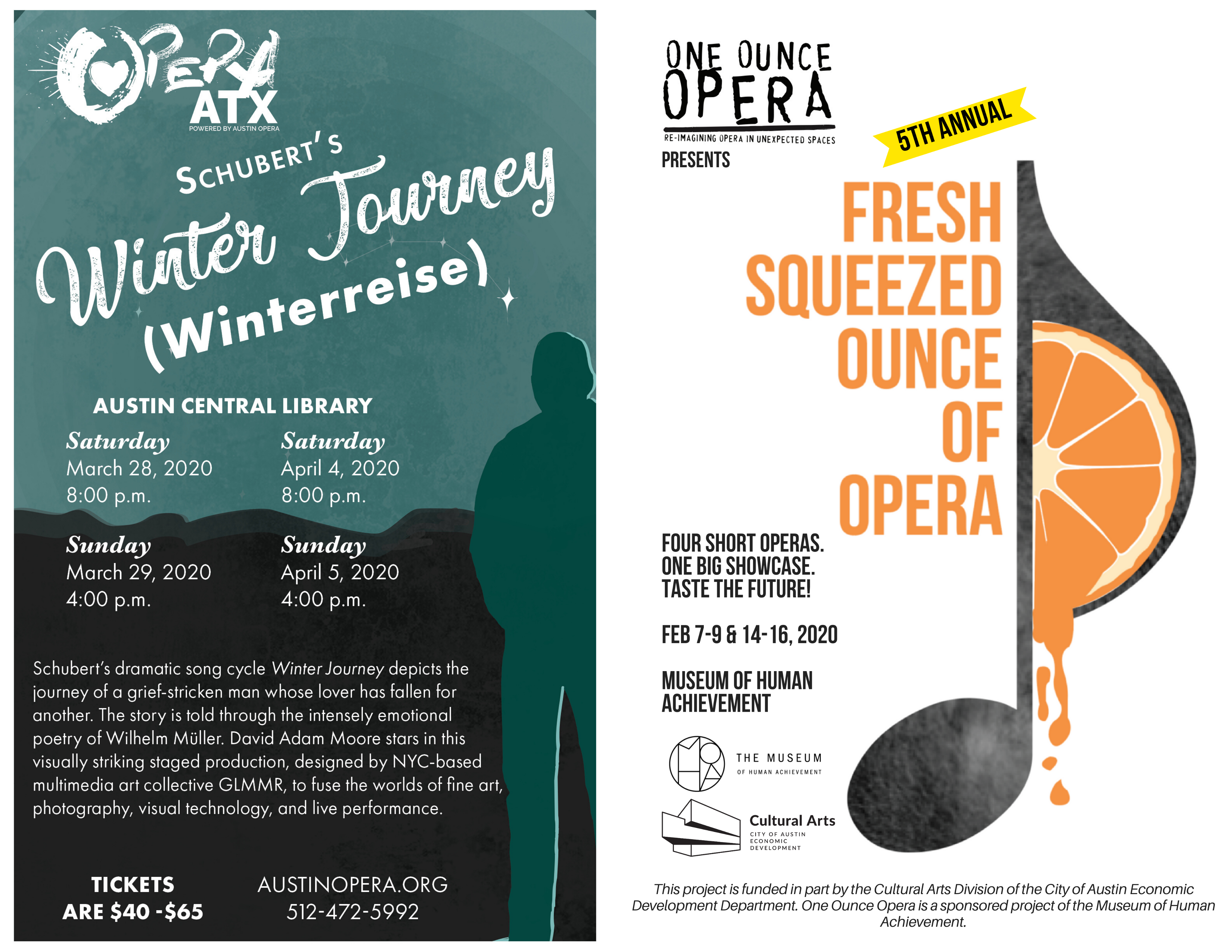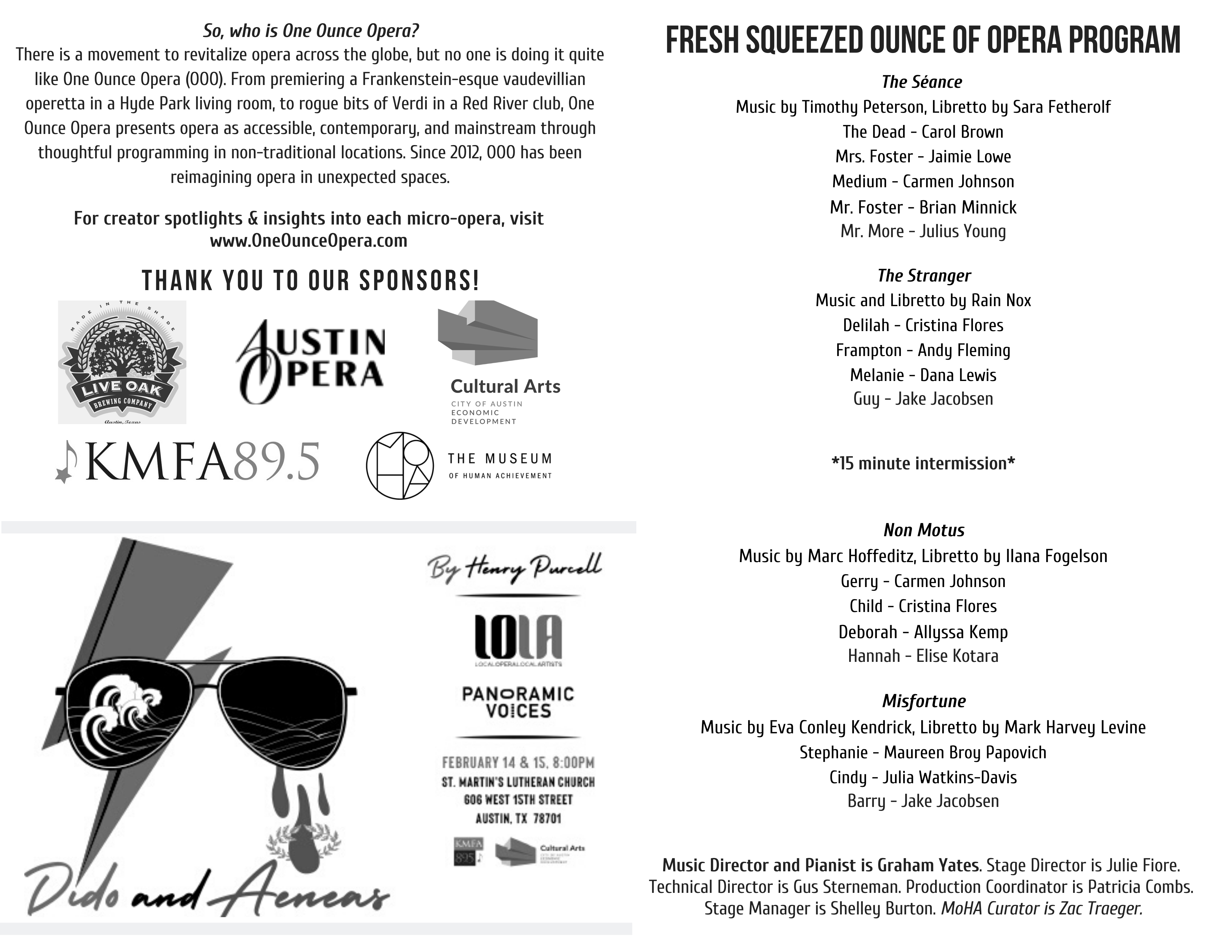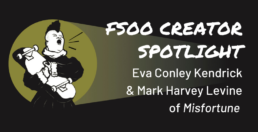Creator Spotlight FSOO 2024: Adrienne Inglis & Lisa Kay Adam
Get to know Composer Adrienne Inglis & Librettist/Poet Lisa Kay Adam, creators of I am worth nothing, which is based on a solo piece commissioned by Austin-based Inversion Ensemble.
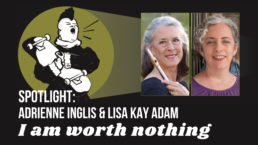
Often the most poignant and powerful dialogue happens between those who create and those who perform. That’s why OOO connects our singing-artists with the composers and librettists selected for the 6th Annual Fresh Squeezed Ounce of Opera.
So if you’re curious about the musical themes, story inspiration, what to listen for, and more, you’re in the right place.
Here, enjoy insights about I am worth nothing, written by Adrienne Inglis & Lisa Kay Adam– with questions from the cast – sure to enhance your FSOO experience.
First a quick synopsis:
I am worth nothing sets a stunning Coahuilteco/English poem by Texas poet Lisa Kay Adam. From the phrase Pīntci nakāmmam axām (I am worth nothing), Adam creates a vivid story of two young Coahuiltecan sisters and their encounters with newly arrived Spanish settlers and mission priests in the eighteenth century. Musically, the florid phrases and haunting modalities join with the sounds of drums and melancholic bells to paint a picture of exploitation, early death, and a lost way of life in the western Gulf coastal plains.
"I am worth nothing” tackles such a heavy and important subject matter. I’m curious if there was something about this specific text from Lisa Kay Adam’s book that drew you to set it to this piece.
Adrienne: I have a sister with whom I am very close. The heartbreaking death of the younger sister plus the tragic intersection of the Coahuilteco people, the mission priests, and the colonial Spaniards all drew me to Lisa’s remarkable poem. With my distant Ojibwe roots, the early eighteenth century setting in the western gulf coastal plains with a peoples whose language is now extinct also fascinated me. I should say that the poem does not explicitly say how the younger sister dies. It could easily have been disease, but her violent death is equally plausible, and arguably, more operatic. I also wanted to honor the vivid imagination and eloquence in which Lisa builds a historically informed and very powerful vignette out of a simple Coahuilteco phrase transcribed by a priest many generations ago.
Where do you see the older sister's character as she tells her story? Do you still see her involved in the church, or do you see her receiving messages of building up as opposed to tearing down?
Adrienne: The older sister strives to make sense of her changing world. She understands that she and her sister have assisted the rest of their distressed family by being traded to the Spaniard for blankets, horses, food, and more. This clear physical representation of their value made them feel helpful and worthy, even though they suffered in their new life with the Spaniard and his wife. When her sister dies, her life is again changed drastically at the cruel and violent hands of the Spaniard. Her world doesn’t make sense any more. When the priest rescues her from the Spaniard, she begins to understand her worth differently. She was not purchased by the priest, so no longer has monetary value. He taught her that not only is she worth nothing, but that she has the heavy burden of sin to carry—such a harsh authoritarian teaching. I like to think that she learns that her ability to work does not define her value, and that she is worthy no matter what. Only by God’s grace through prayer will she fly to heaven, weightless, forgiven, and freed from her sins.
Was there a particular reference point for the priest's music, or a particular vocal style you envisioned? Sounds a bit like Gregorian chant, but I'm curious if there are other influences in there as well.
Adrienne: Yes, liturgical chant absolutely influenced the priest’s part in the final section of the opera. The G minor pentatonic scale common to the Native American flute underpins the melodic material. The priest could choose to interpret the chant strictly as descended from Medieval European roots or showing some connection with the Coahuilteco people by infusing the melisma with typical Native American embellishments.
Creator Spotlight FSOO 2024: Silen Wellington & Walken Schweigert
Get to know Composer Silen Wellington & Librettist Walken Schweigert, creators of What the Spirits Show, which was originally commissioned by the prestigious American Opera Initiative at the Kennedy Center's Washington National Opera. This is its regional premiere.
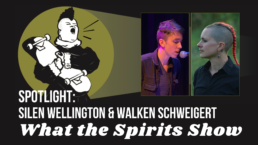
Often the most poignant and powerful dialogue happens between those who create and those who perform. That’s why OOO connects our singing-artists with the composers and librettists selected for the 6th Annual Fresh Squeezed Ounce of Opera.
So if you’re curious about the musical themes, story inspiration, what to listen for, and more, you’re in the right place.
Here, enjoy insights about What the Spirits Show, written by Silen Wellington & Walken Schweigert – with questions from the cast – sure to enhance your FSOO experience.
First a quick synopsis:
Calamus is a teenage artist with a fantastical imagination and endless curiosity. Rather than easels or clay, Calamus’ canvas is their own body. With the aid of a magic elixir, Calamus shapeshifts, expressing their true spirit by bending into different forms and offering the poetry of transformation. But when a tyrannical politician criminalizes such elixirs, Calamus’ world is on the brink of destruction, and they will need all their strength to bend the arc back towards justice…
Why did you opt for a more fantastical setting instead of real life/realism? Does it offer another layer to the story of these genderqueer folx and their plight?
Walken: I have so many answers to this question! I will say first that I am not super interested in realism. In my work, I am always looking for the truth that facts point to, but poetics reveal. I wanted to tell a story that was more universal, that each audience member could contextualize based on their own experience. I wanted to speak to the spiritual side of queerness. I wanted to explore how the knowledge about our transness, as it relates to our authenticity, is spiritual knowledge. Because of that, it felt necessary to have magic to be a part of this world, which felt easier to contextualize in 20 minutes if we were never trying to achieve realism to begin with. In the work, I didn't want to talk about gender explicitly. I wanted to talk about the power of knowing who you are in the face of bigotry, and I wanted to celebrate that power and show its strength. Also, by it happening nowhere identifiable it situates it as happening everywhere, which also felt appropriate.
Silen: Compositionally, I'm often interested in how music can create worlds. In bringing the magic of this world to life, leaning into the fantastical & lush textures of Calamus' magic felt like a way to illustrate the spirituality I feel in my transgender experience, and also to illustrate the bigger story of how magic it is when we embrace who we are.
Is there a reason why Sylvan does not also take the magic elixir as someone who is also gender non-conforming? Is it a choice or because ze can’t use it like Cal can?
Walken: Silen and I wanted to be careful not to essentialize the trans experience. We wanted to be sure that we were not positioning Cal to be a symbol for all trans people. Not all trans people take hormones, and yet we can all be in solidarity in the recognition that we all need different things in our transitions. So it felt important to represent that. Transition looks different for all of us, but the bigotry threatens us all. This makes it incredibly important for us to be in solidarity with each other, regardless what part of the trans experience is being attacked. We can see this in the escalation of the anti-trans legislation over the past few years. It began by focusing on HRT for minors, then included HRT for adults, then social transition for minors and now bills are being proposed with the intention of erasing trans people from public life entirely. So, in regards to Sylvan, the answer is quite simple: ze simply doesn't feel a need for the elixir, but is willing to put zir life and freedom on the line for someone who does.
Silen: This is captured for us in Sylvan's line, "What they're doing to you, they would do to me too." Sylvan not only fights for Calamus because Cal is zir's friend, but because Sylvan recognizes the injustice Calamus faces will inevitably impact zir entire community.
How do you see/imagine the spirits and what they represent? Are they ancestral? Ethereal? Elemental?
Walken: Yes! All of the above! In contrast to the rigid, authoritative monotheism presented by the Politician, I wanted Cal to be coming from a totally different spiritual context and world view. For Cal, the whole world, all of reality, is alive with spirit/spirits including Cal themself.
The morning after my gender affirmation surgery, I saw myself in the mirror as an adult for the first time. Meaning: I suddenly realized that the person I had been looking at for the last 20 years had not been me. It was only now, post surgery, that I was my adult self. This realization floored me. How did I know? How did I know, when so many people told me I was crazy, that this surgery was what was necessary to be who I truly am? Certainly what I had gone through was a physical transformation, but it wasn't just physical. It was mental and emotional, but not just those things either...
Slowly, so slowly it dawned on me that perhaps what I was going through was a spiritual transformation, and perhaps the knowledge of who I am is spiritual knowledge. I'm still trying to figure out what that means, and the writing of What the Spirits Show was a part of that. In the opera, I am trying to describe how the experience felt for me, which also meant trying to get a grasp on my own spirituality. I had flung aside all religion when I came out as trans as a teenager and was rejected by my Catholic parents. So, as an adult in his 30s, I found myself wrestling with how to comprehend the spiritual experience of my surgery and had no framework to help me do that. In my discovery of the Reclaiming tradition of witchcraft, I found a polytheistic worldview (and a broader understanding of spirit than what I had been exposed to in my Catholic upbringing), that helped me understand what I was going through. This opera is a part of my own personal, internal exploration of that spiritual perspective.
I want to also lift up the work of theologian Dr. Justin Sabia-Tanis who I found out later has written about this very idea (that knowledge of one's gender is spiritual knowledge), which I also think is a really elegant way to subvert the nature/nurture argument and many other bigoted beliefs about transness in general.
Silen: For me, being queer and transgender has often meant reaching for a future vision of myself I had no blueprint for. It meant stepping into unknown places with a faith and conviction that my life would feel more true once I did. When I first began questioning my gender identity, I would hear voices entering women's restrooms, asking me "Are you a woman? Are you a woman?Areyouawoman?" And I felt terrified, because that question would unravel everything in my life that I knew and everything in my life that I didn't know. But just on the other side of that question was an unfettered joy I didn't know existed because for so long, I'd strived for only ordinary contentment. I didn't know for sure if answering that question would make anything better about my life, but with what I now can only describe as a spiritual conviction, I knew I had to move through that question.
Transition has often felt like a leap of faith. Medical transition involves some changes I like and some changes I don’t like, but in crossing these thresholds, I learn more about myself and who I need to be. After taking testosterone for a while, after my voice had dropped but before I started growing facial hair, I felt scared because I didn't know if I wanted to have a beard or venture into becoming "cis-passing." In grappling with that decision, it was through rituals, trances, meditations, that I met a future version of myself — fully bearded, who held me and beamed with self love. It wasn't that I knew I was going to become that beardly self, or that I necessarily needed to look that way to love myself, but by seeing that vision, I could move forward with my choices about medical transition trusting that no matter what happened, I would learn how to love myself.
Even in starting aspects of social transition, when I tried out a new name or pronouns, I wasn't totally sure if I would like it or not, and went through a few different names before I found the ones that made my spirit sing. The line "There is a longing in my soul, a yearning indescribable" really encapsulates that experience for me, of yearning for things to be different, but not having any words to describe it until I depart from my known reality. It reminds me of the words of the queer theorist, José Estaban Muñoz, who writes in Cruising Utopia that queerness is "that thing that lets us feel that this world is not enough, and indeed something is missing.” The yearning was that thing that let me know something was missing from my life, and following it was a spiritual quest.
In my spiritual traditions, I talk to spirits, Gods, Ancestors, Elements, all of whom have imparted different affirmations and wisdom to me over the years of my transition. However, I share the examples above to illustrate how the "spirits" in What the Spirits Show can be many things, and perhaps most importantly, for me they represent the mysterious knowing within each of us that charges us to move towards our authentic selves.
We have some guesses, but was there anyone in particular that you based the politician character on?
Walken: I began writing this opera around the same time certain people in power began trying to publicly separate supportive parents from their trans kids. This affected me on multiple levels, including that friends and friends of friends of mine who were living in Texas at the time were reaching out to me looking for sanctuary in Minnesota. It was heartbreaking, and it also made me think of how amazing it would have been if my parents had supported me when I came out. I thought of all the things that I wish they would have said to me at that time and put it into the opera.
I do want to be clear though that if anything the Politician says are things that a politician has actually said, that is entirely a coincidence. This character is a cartoon villain, in an opera whose purpose is not to denigrate him nor Christianity, but rather to explore and show the power of affirming transness and its relation to spirit.
photo credit for Walken: Kimani Beard
Creator Spotlight FSOO 2024: Nell Clowder & Linda Nenno
Get to know Composer & Librettist Nell Clowder and Dramaturg Linda Nenno, creators of An Artist's Regrets, getting its world premiere with One Ounce Opera.
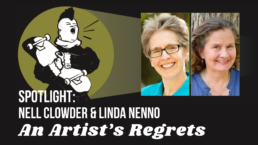
Often the most poignant and powerful dialogue happens between those who create and those who perform. That’s why OOO connects our singing-artists with the composers and librettists selected for the 6th Annual Fresh Squeezed Ounce of Opera.
So if you’re curious about the musical themes, story inspiration, what to listen for, and more, you’re in the right place.
Here, enjoy insights about An Artist’s Regrets, written by Nell Clowder & Linda Nenno, – with questions from the cast – sure to enhance your FSOO experience.
First a quick synopsis:
Immersed in a storm of contemplation and reflection, an Artist questions her chosen paths – and what she should’ve done instead – with the help of three unexpected yet all-too-familiar guests. How will what the guests offer affect the Artist’s interpretation of what has become their deepest regrets?
This opera plays with time travel in a sense, visiting yourself at different ages. If you had to choose only one: to go back and see your younger self, or travel forward and see your older self, what would you choose, and why?
Nell: That is a tough question. My past history holds no mystery and I wouldn't want to mess with my younger selves or confuse them. They did what they did, and they did the best they could. On the other hand, I'm not eager to see myself further aged. And whatever wisdom an older self would have for me: if I were ready for that, wouldn't it be coming to me on its own, anyhow? There are so many sources of wisdom in this world, once you open to it coming from unexpected places. In thinking about the ending, Linda posed the question, "What is the opposite of regret?" I think one opposite of regret is focusing in the present, living your life now and letting go of the past (and future). So if you give me a time travel ticket, I'm not using it to go to Nell Land.
Linda: Goodness, that question scares me a little. It is seductive to think that I could go back and relive an earlier part of my life when I thought I was happy and healthy and whole but I think I am happier and healthier and more whole in my life right now than I have ever been. Who knows what the future holds?
How did you decide to assign the ranges for the different ages represented? Was the impetus for writing this opera/libretto autobiographical in nature? If so, was the process of writing this opera/libretto therapeutic?
Nell: They say about writing that you should "write what you know." On the other hand, being too close to your subject matter, making it too personal, can cause problems. It was serendipity that the subject matter of "An Artist's Regrets" was something Linda had been thinking about, but not so much for me. The inspiration for the opera came from Linda's experience, but by the time I twisted it this way and that for dramatic and musical purposes, it was autobiographical only in a broad sense. We developed the scene with the youngest self first. Then followed the scene with a middle-aged character, and the goal there was to create a strong contrast, to not repeat the emotional dynamic of the first scene. The idea to introduce a senior self came later. The specific ages for the characters were chosen just to give a nice spread between them.
Linda: Since it started as my story, the ages we picked were linked up to significant times in my life where there were issues that I was having some regrets about.
Is the character in your opera based on your life or someone you know, or just the general young artist?
Nell: The twenty-year old artist character represents aspects of both Linda and me as young adults. And, I suspect, of many other artists as well. We were caught up in our "thing" and the thing did not involve financial planning or thinking about the future.
Linda: Yes, it did start from my personal story but as Nell said, it evolved into our story and then hopefully it will resonate with everyone.
I love that the end of the opera is about not having regrets. Did you start out with that intention or did the piece evolve as you wrote it?
Nell: I hoped from the early stages that the story would end up with the protagonist relieved of her burden of guilt and regret. How to do that without being preachy or schmaltzy was a major concern. I felt that the audience would be bored if the pattern of interacting with a past self was repeated a third time, so the idea of flipping that – of having a future self come back to the protagonist – presented itself, and the way to finish the opera came clear. An older self offered a voice that could help the protagonist finish her journey toward self-forgiveness.
Linda: When Nell and I started this process I truly was having regrets about some choices that I did or did not make in my past. I would say I was struggling with a lot of self judgement that was really getting me nowhere. The collaboration with Nell helped me take it away from my personal struggle and into a more universal awareness that we all share as human beings, That led me to a very new perspective and now I wouldn't change a thing. Well, maybe I would have been a bit more financially responsible to myself, but now I do understand that I am right where I need to be.
photo credit for Nell: Mindy Best
6th Annual FSOO
The production team, casts, and winning micro-operas you experienced in the 6th Annual Fresh Squeezed Ounce of Opera showcase (2024)
Stage Director & Producer – Julie Fiore
Music Director & PIanist – Joseph Choi
Technical Director – Gus Sterneman
Assistant Director – Carol Brown
Stage Manager – Suzanne Smith
House Manager – Carlee Abschneider
FSOO 2024 Winning Works
Cast:
59 Year Old – Kristin Bilodeau
20 Year Old – Mikaela Pace
40 Year Old – Maureen Broy Papovich
80 Year Old – Angela Irving
Synopsis:
Immersed in a storm of contemplation and reflection, an Artist questions her chosen paths – and what she should’ve done instead – with the help of three unexpected yet all-too-familiar guests. How will what the guests offer affect the Artist’s interpretation of what has become their deepest regrets?
If you’re curious about An Artist’s Regrets’s musical themes, story inspiration, what to listen for, and more, click here for the Creator Spotlight.
Originally commissioned by the Kennedy Center’s American Opera Initiative
Cast:
Bubbie – Cassidy Wallace
Demon – Robert LeBas
Karen – Maureen Broy Papovich
Synopsis:
Bubbie has filled the void of Covid isolation by solving as many word searches and crosswords as possible…until her latest puzzle turns out to be a ƈʊʀֆɛɖ ֆʊʍʍօռɨռɢ ɨռƈǟռȶǟȶɨօռ that conjures a Demon from the netherworld. When Bubbie welcomes him with delight, insisting he must be her long-lost goth grandson, how far will her well-intentioned neighbor Karen go to convince the old woman that something is horribly wrong? A pandemic take on a viral internet myth, this short piece weaves together classical music and heavy metal to pose thorny questions about chosen family and what constitutes true evil.
If you’re curious about Bubbie and the Demon’s musical themes, story inspiration, what to listen for, and more, click here for the Creator Spotlight.
Originally commissioned by Inversion Ensemble, Austin, TX
Cast:
Older Sister – Cristina Jones
Younger Singer – Anneliese Sandoval
Father/Spaniard/Priest – Stephen Maus
Synopsis:
I am worth nothing sets a stunning Coahuilteco/English poem by Texas poet Lisa Kay Adam. From the phrase Pīntci nakāmmam axām (I am worth nothing), Adam creates a vivid story of two young Coahuiltecan sisters and their encounters with newly arrived Spanish settlers and mission priests in the eighteenth century. Musically, the florid phrases and haunting modalities join with the sounds of drums and melancholic bells to paint a picture of exploitation, early death, and a lost way of life in the western Gulf coastal plains.
If you’re curious about I am worth nothing’s musical themes, story inspiration, what to listen for, and more, click here for the Creator Spotlight.
Visit Adrienne Inglis’s website
Find out more about Lisa Kay Adam’s poetry
Originally commissioned by the Kennedy Center’s American Opera Initiative
Cast:
Calamus – Chelsea Scott
Sylvan – Allyssa Kemp
Aurora – Carol Brown
Politician – Jake Jacobsen
Synopsis:
Calamus is a teenage artist with a fantastical imagination and endless curiosity. Rather than easels or clay, Calamus’ canvas is their own body. With the aid of a magic elixir, Calamus shapeshifts, expressing their true spirit by bending into different forms and offering the poetry of transformation. But when a tyrannical politician criminalizes such elixirs, Calamus’ world is on the brink of destruction, and they will need all their strength to bend the arc back towards justice…
If you’re curious about What the Spirit Show’s musical themes, story inspiration, what to listen for, and more, click here for the Creator Spotlight.
Immerse yourself in dynamic storytelling!
For the first time since 2020, experience the much-anticipated return of the micro-opera showcase of the year! Limited seats per show. Gather your most curious crew and join us!
How we got here:
One Ounce Opera, in our annual call for scores, reviewed over 40 works submitted from all over the world.
We lined up an engaging program of four (4) new micro-operas that will immerse you in the sonic tellings of connective, transformative, oh-so-human stories.
Stories that feel NOW.
Dynamic.
Familiar, yet…not.
And you can experience all four in a single program: The 6th Annual Fresh Squeezed Ounce of Opera!
Showtimes are February 23, 24, March 1, & 2, 2024 at 7:30 pm; and February 25 & March 3, 2024 at 2:00 pm. We’ll once again transform The Museum of Human Achievement in East Austin and welcome you and your friends to reimagine opera in an unexpected space.
(notes: recommended for ages 10+, due to subject matter and some brief language. total runtime is about 110, which includes a 20 min intermission. dress for the weather – the venue is akin to a comfy, fully-enclosed barn – talk about unexpected!)
Q: CAN YOU PURCHASE TIX AT THE DOOR? A: Yes! $25 suggested donation, cash or card (we use Square) – unless we sell out. Less than 90 seats per show available, so we suggest claiming yours ahead of time!
Announcing the Winning Selections for FSOO 2024
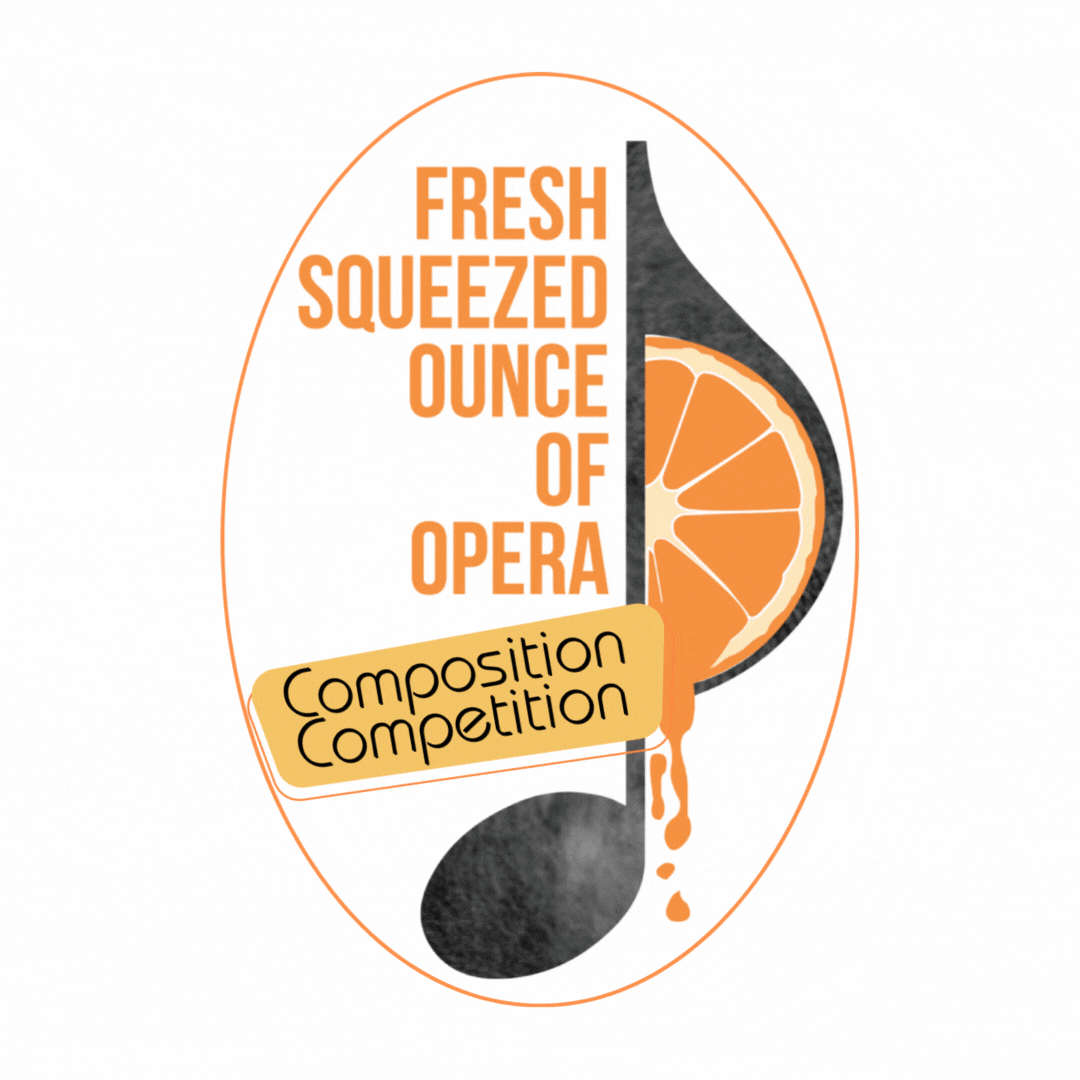
One Ounce Opera, in our annual call for scores, reviewed over 40 works submitted from all over the world.
We worked diligently to line up an engaging program of four (4) micro-operas that will immerse you in the sonic tellings of connective, important, oh-so-human stories.
Stories that feel NOW. Dynamic. Familiar, yet…not.
In early 2024, you can experience all four in a single program:
The 6th Annual Fresh Squeezed Ounce of Opera!
If you haven’t already, mark your calendars for February 23-25 and March 1-3, 2024. We’ll once again transform The Museum of Human Achievement in East Austin and welcome you and your friends to reimagine opera in an unexpected space.
The four winning works, in alphabetical order by title, are:
Synopsis:
Immersed in a storm of contemplation and reflection, an Artist questions her chosen paths – and what she should’ve done instead – with the help of three unexpected yet all-too-familiar guests. How will what the guests offer affect the Artist’s interpretation of what has become their deepest regrets?
Originally commissioned by the Kennedy Center’s American Opera Initiative
Synopsis:
Bubbie has filled the void of Covid isolation by solving as many word searches and crosswords as possible…until her latest puzzle turns out to be a ƈʊʀֆɛɖ ֆʊʍʍօռɨռɢ ɨռƈǟռȶǟȶɨօռ that conjures a Demon from the netherworld. When Bubbie welcomes him with delight, insisting he must be her long-lost goth grandson, how far will her well-intentioned neighbor Karen go to convince the old woman that something is horribly wrong? A pandemic take on a viral internet myth, this short piece weaves together classical music and heavy metal to pose thorny questions about chosen family and what constitutes true evil.
Originally commissioned by Inversion Ensemble, Austin, TX
Synopsis:
I am worth nothing sets a stunning Coahuilteco/English poem by Texas poet Lisa Kay Adam. From the phrase Pīntci nakāmmam axām (I am worth nothing), Adam creates a vivid story of two young Coahuiltecan sisters and their encounters with newly arrived Spanish settlers and mission priests in the eighteenth century. Musically, the florid phrases and haunting modalities join with the sounds of drums and melancholic bells to paint a picture of exploitation, early death, and a lost way of life in the western Gulf coastal plains.
Originally commissioned by the Kennedy Center’s American Opera Initiative
Synopsis:
Calamus is a teenage artist with a fantastical imagination and endless curiosity. Rather than easels or clay, Calamus’ canvas is their own body. With the aid of a magic elixir, Calamus shapeshifts, expressing their true spirit by bending into different forms and offering the poetry of transformation. But when a tyrannical politician criminalizes such elixirs, Calamus’ world is on the brink of destruction, and they will need all their strength to bend the arc back towards justice…
These folks are creating the future of the operatic art form, and OOO is thrilled to give you an opportunity to experience their work in Austin. In the coming weeks, you’ll have a chance to get to know your 2024 crop of creators through our series of FSOO Composer & Librettist Spotlights.
Details on how to secure your tickets for the 6th Annual Fresh Squeezed Ounce of Opera, Feb. 23-25 & Mar 1-3, 2024 – COMING SOON.
Thank you for being a part of re-imagining opera in unexpected spaces!
The 6th Annual Fresh Squeezed Ounce Call for Compositions is Live!
WE'RE SO EXCITED. IT'S THAT TIME!
To see details and rules, and to apply now, click on the link below!
Tenth Anniversary and Big News
A decade ago tonight, August 23, 2022, in a sexy, sweaty bar on E. 7th Street, One Ounce Opera artists poured their hearts and souls (amid skinned knees and torn zippers) into a raucous, vaudevillian-style showcase that officially launched the company.
In the decade since, we’ve poured ounces of opera into the hearts and souls of our sweet, sweet community. How did we get here?
You. We’re here because you supported the idea of the region’s first micro-opera festival, and then came out despite the ice. Or heat. Or rain. Or cold. You were more reliable than the US MAIL.
You jumped at the chance to drink beer with us while we serenaded and soothed, in lovely gardens or tiny clubs, in living rooms or beer halls.
You brought friends. Or relatives. Or both. And sometimes, those friends became relatives (how many couples met because of OOO?)!
But more than anything, you supported us and our punk-rock hearts, brave enough to boast that “opera isn’t obsolete, popular opinion of opera is.”
And you proved us right time and time again.
And now, with your support, the next ten years will be bigger, better, and brighter, using opera as our vehicle for deepening connection and community.
OOO nominated for five B. Iden Payne Awards
Yesterday was a great day!😎
We're thrilled to announce the following five (!!!) B. Iden Payne Awards Council nominations for the 5th Annual Fresh Squeezed Ounce of Opera showcase held February 2020 at The Museum of Human Achievement:
- The "Non Motus" Cast, Crew, and Production Team for Outstanding Production of Musical Theatre
- "Non Motus" creators Marc Hoffeditz and Ilana Fogelson for Outstanding Original Score
- Cristina Flores: Outstanding Featured Actress-Musical Theatre for her role in "The Stranger" by Rain Nox, as Delilah
- Julie Fiore: Outstanding Direction of Musical Theatre for her stage direction of "Non Motus"
- Graham Yates: Outstanding Musical Direction for the full run of Fresh Squeezed Ounce of Opera 2020.
👏👏👏 We're so proud y'all!
Re-live the experience and watch the nominated pieces here!
https://youtu.be/Fri-D8P_Jxs
FSOO Creator Spotlight: Eva Conley Kendrick & Mark Harvey Levine
Introducing the 5th Annual Fresh Squeezed Ounce of Opera showcase winners Eva Conley Kendrick (composer) and Mark Harvey Levine (librettist), creators of the micro-opera Misfortune, in its Regional Premiere.
Performing and producing new works by living composers and librettists offers artists the opportunity for real-time communication. After spending time with the scores and their characters, cast members Maureen Broy Papovich, Jake Jacobsen and Julia Watkins-Davis had these questions for the creators:
What is your interpretation of what goes on in this story? Is there something supernatural at work here with these cookies? Were they meant for Barry?
Eva Conley Kendrick [ECK]: Mark will be the one to answer this but I like to think there is something supernatural at work here.
Mark Harvey Levine [MHL]: There is definitely something supernatural at work here -- I always like a little touch of magic in my plays. As to the last question -- well, that's answered at the end.
Were you drawn to this story or inspired by it based on a personal experience?
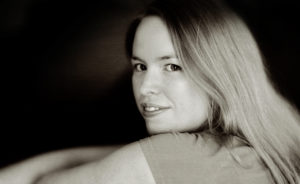
ECK: I have had many eerie coincidences occur in my life, and at least one has involved a fortune cookie. I did get the same fortune cookie two nights in a row at two different Chinese restaurants on two different sides of San Francisco, when I lived there. Possibly the most eerie coincidence occurred many years ago when my family and i were dropping my sister off at the Boston Amtrak at South Station to go seek her fortune as a cartoon animator on the TV show Animaniacs, where she'd just been hired. We discovered that our car had been towed. In my 14 year old despair I turned to my sister and said "I wish Paul S_____" was here. Paul was an opera singer I'd worked in the summer before and just happened to be the first person who came to my mind because he was the only person I knew who lived in Boston (actually, I discovered later he actually lived in Revere but worked in Boston). No sooner than the words were uttered, my sister and I looked up the road and there was Paul S_____ strolling towards us. He helped my parents locate the lot where our car had been towed to and he snuck us through the turnstile to get to the train with his pass which was helpful since my parents just had about enough money to get the car out of the lot. So Paul did save the day after all, and did I summon him with my words? Was it the biggest coincidence ever in a city with a population over 600K? Maybe...we'll never know, just like the fortune cookie.
MHL: I've drawn from personal experience -- I've eaten at a lot of Chinese restaurants. I love Chinese restaurants. Anything can happen at a Chinese restaurant.

The weirdest coincidence that ever happened to me ALSO took place in Boston. Why do these things always happen in Boston? I was visiting a friend there, and wanted to cross the street. As I stepped off the corner, I saw a vehicle coming out of the corner of my eye, so I jumped up back onto the curb so I wouldn't get run over.
The vehicle was a hearse. A hearse with my name on it.
"Levine", it said, in big letters on the side.
Question for Eva Conley Kendrick: I've always wondered how a composer goes about setting conversational texts. It seems so tricky!
ECK: In setting texts I think of the natural rhythm of the spoken phrase and also the dramatic intent behind the words. If I was setting a sentence of text to music and it was uttered as a question, a statement or an exclamation, I would set the sentence musically three different ways. The register—or the range of how high or low it would fall in the singers voice—also depends on the mood or dramatic intent. If someone is demanding something, for example, it would probably be lower and louder, more assertive, whereas if someone was wheedling, it would be higher and softer, just as it would be if it were spoken. I greatly enjoy writing recitative sections of music or the sung dialogue sections because it can transport a commonplace or intense conversation into an operatic world of sound.
Question for Mark Harvey Levine: I see that on your website, you are a playwright. How is writing a libretto different for you? It seems as though it would be a very different style.
MHL: I would think it would be a different style to write one, but Eva was incredibly generous. See, "Misfortune" is a ten minute play of mine. I thought she was going to ask for all sorts of changes, cuts and rewrites to turn it into an Opera. But no, she simply set it to her wonderful music, without asking me to change anything. I was very grateful.
Watch this preview with the cast of Misfortune!
